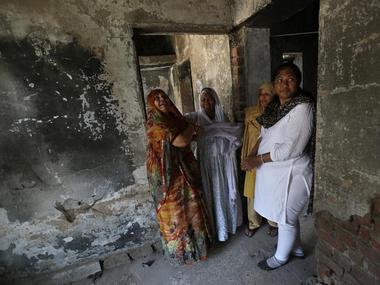What will be the political fallout of the Gulbarg massacre convictions? Nothing, and we’ll come to why in a bit. First, all Indians must be warmed by the fact that we are seeing convictions in cases of mass murder. The Gulbarg Society case is another in a series of matters in which courts have given justice to survivors. A quick reminder for those who may have forgotten or not have known, these investigations were not conducted by the Gujarat Police. All of these big cases were worked on by a special team sent to Gujarat by the Supreme Court. Why was a team sent from the outside? Because the Gujarat police was incompetent and lousy. [caption id=“attachment_2812352” align=“alignleft” width=“380”] File image of the survivors of the 2002 Gujarat riots inside a house that was burnt and damaged in the riots at the Gulbarg Society. Reuters[/caption] Who was in charge of it? Minister of state for home Amit Shah. And the cabinet charge was with then chief minister, Narendra Modi. In any civilised democracy, such demonstrable incompetence necessitating intervention from the Supreme Court would have been a sackable offense. Not so here and, again, we’ll come back to why later. What separates the Gujarat massacres from other riots in 1992 and 1984 is the role of civil society activists, lawyers and journalists. It is the dogged work of such people as Teesta Setalvad and Indira Jaising and Raju Ramchandran, and groups like the Centre for Social Justice that have provided closure to many survivors. In the face of persecution (I use the word with full responsibility) by the BJP and villification by much of the media, these people have soldiered on and produced results. If you noticed that the BJP was silent on Wednesday, it was because they knew their slander does not work in the face of facts. The slander will begin again (Teesta was raided by a dozen CBI officers who came up with the revelation that she had eaten a Subway sandwich, had a haircut and bought sanitary pads) but for the moment at least, there is silence. The BJP’s silence is a strategic one. It has been the standard response of the party each time it has been exposed on the matter of its incompetence or its culpability. The party did not condemn or even comment on its minister, Maya Kodnani, convicted of murdering 95 Gujaratis at Naroda Patiya. Modi, in fact gave her tickets to contest and made her a minister while knowing (as he surely did, since he was home minister) what she had done to her own constituents. Such silence is beyond shameful. Before he died, the great Kannada scholar and intellectual UR Ananthamurthy wrote one last work in which he excoriates Hindutva. Of the prime minister, he wrote:
“How did Gujarat produce a pan-Indian hero? The Gujarat massacre took place when he was chief minister. To say that he tried to prevent it but failed, would mean he was weak. Nobody can say that. One is reminded of an image used by the poet Adiga. When yajnas are conducted, everyone present is involved in some task or the other. But a mantrajnya, an expert in the mantras, does not participate. He is known as the ‘brahma’, and is crucial to the ritual. The brahma does nothing. Modi was the brahma. Whatever happened has happened.”
This is a terrible judgment from a very serious individual, who was a nationalist and on the same side as the BJP on many issues, including the renaming of cities. However, it will not be exploited. The fact is, that to exploit such material one requires political ability and not even the voters of the Congress will concede that Rahul Gandhi has such ability. He has shown no skill at using openings on any of several fronts made available to him in the last two years (foreign policy failures, fake nationalism debates, economic mediocrity and so on). This is why I say that there will be no political fallout of the Gulbarg massacre convictions, just as there was none when Kodnani was convicted. Modi, the head priest when this terrible yagna was conducted, can continue to remain mum.


)

)
)
)
)
)
)
)
)



